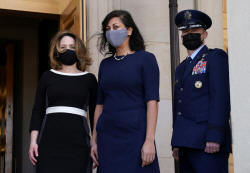|
The
computer-aided simulations included potential shooting down of
U.S. missile-tracking satellites, satellite jamming, and other
electronic warfare "effects" that are possible tactics in space
warfare. Actual satellites are not used.
During a visit to Schriever Space Force Base in Colorado, Deputy
Secretary of Defense Kathleen Hicks saw the 'Space Flag'
simulated space training exercise hosted by U.S. forces. It was
the 13th such exercise, and the third to involve partners such
as Britain, Canada and Australia.
"It happens in rooms like that ... people at a relatively junior
level in many cases. Collaborating and thinking through
challenges and trying to figure out concepts that seem to make
sense and discarding ideas that go astray," Hicks told reporters
en route to Hawaii.
Pentagon leaders are touring U.S. bases this week while the
Biden administration's draft 2023 budget takes shape. The
Department of Defense hopes to move budget dollars toward a
military that can deter China and Russia.
After Russia successfully conducted an anti-satellite missile
test last month, U.S. officials believe there is an increasing
need to make the U.S. satellite network resilient to attack and
to use opportunities like 'Space Flag' to train.
Satellites are vital to military communications, global
positioning navigation, and timing systems that are needed in
the event of war.
The 10-day-long space war game attempts to simulate the cutting
edge of the U.S. capability in space. The training exercise
involved an adversarial group working to simulate an aggressor
nation with space capabilities like Russia or China.
Russia is not the first country to conduct anti-satellite tests
in space. The United States performed the first in 1959, when
satellites were rare and new.
In Hawaii, Hicks will meet with Pacific military commanders and
visit Red Hill Bulk Fuel Storage Facility at Joint Base Pearl
Harbor-Hickam where she will hear about water contamination
issues.
(Reporting by Mike Stone at Peterson Space Force Base in
Colorado, Editing by Rosalba O'Brien and Richard Pullin)
[© 2021 Thomson Reuters. All rights
reserved.] Copyright 2021 Reuters. All rights reserved. This material may not be published,
broadcast, rewritten or redistributed.
Thompson Reuters is solely responsible for this content.

|
|





